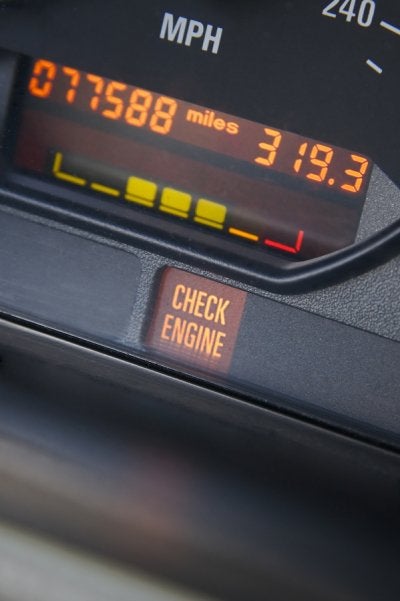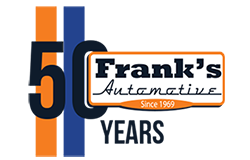-
Frank’s Automotive Diagnostics Services
People visit their doctors for a health checkup all the time, and yet few people every take such precautionary measures with their vehicles. However, there are just as many benefits of knowing the health and condition of your car as there is of knowing your own physical health. Fortunately, Frank’s Automotive in Sacramento offers automotive diagnostics services that can give you a detailed overview of your vehicle’s condition. By knowing the state your car is in, you can prevent minor problems from getting worse and costing you more in automotive repair costs later on down the line. Diagnostics can also save you time and frustration by helping to prevent a break down later on.
To learn more about Frank’s car diagnostics services, call (916) 28-8297. You can also schedule a diagnostics appointment online. When you call, be sure to ask about Frank’s current automotive maintenance and repair specials.
-
Why Is Your Check Engine Light On?
Check engine light on? This is one of the biggest automotive headaches drivers deal with, not necessarily because a check engine light means anything serious but because of the number of different possibilities that could be causing the light to come on. That’s why your best bet is to visit an auto repair shop in Sacramento that specializes in check engine light diagnostics . A mechanic will use advanced diagnostic equipment to pinpoint exactly what’s causing your check engine light to come so you can get back on the road as quickly as possible. In the meantime, here’s a look at some possible causes of a check engine light.

Faulty Oxygen Sensor
The oxygen sensor measures the amount of unburned oxygen in the vehicle’s exhaust system. A faulty oxygen sensor can cause the engine to burn more fuel than needed, resulting in up to 40% lower fuel economy. Failure to replace a faulty oxygen sensor over time can also cause damage to the catalytic converter.
Damaged Catalytic Converter
The catalytic converter converts carbon monoxide into carbon dioxide. Typically, the catalytic converter will become damaged due to neglected maintenance or a problem with one of the sensors (mass airflow sensor, oxygen sensor, etc.). Your vehicle will not pass emissions testing with a faulty catalytic converter, and you can experience reduced performance in addition to poor fuel economy.
Loose or Missing Gas Cap
That’s right, one of the most common causes of the check engine light is simply a loose or missing gas cap. If the check engine light is on, make sure the gas cap is securely fastened and doesn’t appear to be cracked, chipped, or visible damaged in any way. If the gas cap looks good, bring your vehicle to an auto repair shop in Sacramento and let a mechanic perform a check engine light diagnostic to figure out exactly what’s going on with your car.
-
How Often Should You Change Your Oil
The old rule of thumb regarding oil changes (every 3,000 miles or three months) doesn’t necessarily hold up today. Although this is a great benchmark to stick to, modern engines and new oil additives and technologies have allowed drivers to go much longer in between oil changes. It depends on the age and condition of your vehicle, as well as the type of oil you put in the engine. Watch this video to learn more about oil change intervals.
To take the guesswork (and grease work) out of changing your car’s oil, bring it to a car repair shop in Sacramento. An experienced mechanic will be able to change the oil in your vehicle and get you back on the road in no time at all. When you visit an auto shop for the first time, ask the mechanic for a recommended oil change interval based on the age and condition of your engine. Your mechanic may recommend a different maintenance schedule from what’s in the owner’s manual based on the condition of your vehicle.
-
The Importance of Following a Maintenance Schedule
You rely on your car almost every day, which is why there’s no such thing as a good time for your vehicle to break down. Fortunately, you can keep your ride in tip-top shape by following a maintenance schedule set by the carmaker or recommended by your Sacramento auto mechanic . Either way, following a maintenance schedule is one of the best things you can do for your vehicle (and your wallet). Read on to learn more about the benefits of following a routine maintenance schedule.

Prevent Major Automotive Problems
There’s no telling when an automotive problem can materialize, but you can take steps to keep your car running smoothly and without hassle by following a routine maintenance schedule. The maintenance plays a role in preventing automotive problems, but the real benefit is bringing your vehicle to a car repair shop in Sacramento where a mechanic can look for signs of minor problems before they get any worse. If you visit the same car repair shop for all of your maintenance needs, you can build a relationship with your mechanic who will be even better at spotting problems.
Keep Your Car Running Efficiently
Gas prices are low at the moment, but there’s no telling when prices can skyrocket again. Fortunately, following a routine maintenance schedule can go a long way towards optimizing your vehicle’s fuel economy. When everything is running smoothly, your engine is able to burn gasoline more efficiently which means fewer stops at the pump and more miles per tank.
Put Extra Money in Your Pocket
If you need another reason to follow a maintenance schedule for your vehicle, how about this: Routine maintenance will put extra money in your pocket over the life of your vehicle. First, by preventing major automotive problems, maintenance can help you save hundreds or even thousands of dollars on auto repair costs. And you’ll also notice savings at the pump since you won’t have to fill up as often thanks to your car’s improved gas mileage.
RECENT POSTS
categories
- Uncategorized
- Automotive
- automotive diagnostics services
- Frank’s Automotive
- auto shop
- oil change
- Auto mechanic
- Maintenance
- maintenance schedule
- Catalytic Converter
- Engine Light
- oxygen sensor
- Transmission Problems
- BMW
- Pre-Purchase
- Brakes
- Anti-Lock Brakes
- Auto Diagnostics
- Alternator Repair
- Slipping Transmission
- Engine Trouble
- Brake Sounds
- Frank’s Automotive
- Frank Lettini
Archives
2022
2020
2019
2017
2016
- December (4)
- November (5)
- October (4)
- September (4)
- August (4)
- July (4)
- June (4)
- May (4)
- April (4)
- March (4)
- February (4)
